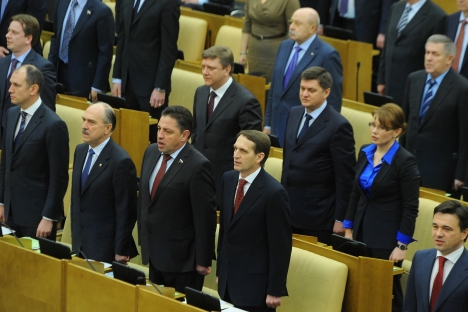Russia’s cancerous corruption needs new class therapy

The Kremlin's much-publicised anti-corruption campaign, which has hit the headlines recently, will hardly change anything. Source: ITAR-TASS
We all knew it was big, but the figure still shocks. A recent survey by the Global Financial Integrity, which is a branch of the Centre for Policy Studies (a centre-right UK think tank), found that the size of Russia's underground or “grey” economy is 46 percent of the country's GDP.
This figure is slightly higher than the World Bank’s estimate of 43.8 percent. But for a G8 country, this is a veritable disaster.
The same study found that nearly $800 billion departed Russia since 1994 (the first year capital outflow data became available). More than $200 billion of this money was illicit.
The report stated that a lot of this money makes its way back into Russia to finance the “grey” sector, for example through export “mis-invoicing.” The section of the report dedicated to Cyprus – the biggest conduit of Russian capital in both directions – reads like a draft of a “white collar crime” novel by John Grisham.
While the well-intentioned folks at the Centre for Policy Studies call on the Russian government to address the issue urgently, they probably know that these recommendations will not be followed.
I have written several times in this column that one cannot fight corruption and introduce good governance in a country where corruption is the main method of governance. Which, sadly, in my view, is the case in Russia.
Exchanging loyalty for impunity was sometimes a necessary evil in the early 1990s, when President Boris Yeltsin used mass privatization and asset stripping as a way of creating a new class of private owners. He wanted to fend off the possible challenge from the entrenched Communist Party nomenclature, which, it was feared, was eager for a rematch. They were, to a large extent, bought off, having been given large chunks of formerly state property.
In the second half of the 1990s, as well as in the ongoing Vladimir Putin era, no attempts have been made to change the situation and start moving toward building up institutions that promote transparency and security, rather than personal loyalties. This creates insecurity and stimulates capital flight.
This is one of the reasons behind the so-called “Russia fatigue” that foreign investors are experiencing now. There were some who believed that after his return to the Kremlin last year, Vladimir Putin would introduce robust (even if authoritarian) economic policies, favouring investment and cleaning up corruption. Nearly a year has a passed, and it is clear by now: there will be no breakthrough.
The giant size of the underground economy is proof that despite all the promises to “clean up the 1990s mess,” dating back to the beginning of Putin's time in power, have remained just that – promises. The “grey sector” just grew together with the hydrocarbons boom and has become cancerous.
Moreover, if one believes the Global Financial Integrity paper, the vast part of this economy would have never existed if state bureaucrats weren’t deeply involved in illicit activities.
The Kremlin's much-publicised anti-corruption campaign, which has hit the headlines recently, will hardly change anything. Even if it was a sincere attempt to clean up the country (which I do not believe it was – for reasons specified earlier), it was doomed to failure. To close up such a huge “black hole” in the economy one needs to do more than just put a few officials (even high-level ones) behind bars.
They publicly execute corrupt bureaucrats in China (where transparency and corruption issues are also acute), but it doesn't help. Without institution building, democratic accountability and, most importantly, a new political class, this cancer of the economy (and society) cannot be cured.
But a new political class cannot appear out of nowhere. So even if tomorrow, Russia's still weak opposition miraculously grabs the reigns of power, it will face the same dilemma and, moreover, have the same bureaucracy to tackle the challenge. As far as the cleanup of Russian economy is concerned, the future doesn't look bright at all. A miracle seems to be all that can be hoped for.
First published in RIA Novosti.
All rights reserved by Rossiyskaya Gazeta.
Subscribe
to our newsletter!
Get the week's best stories straight to your inbox